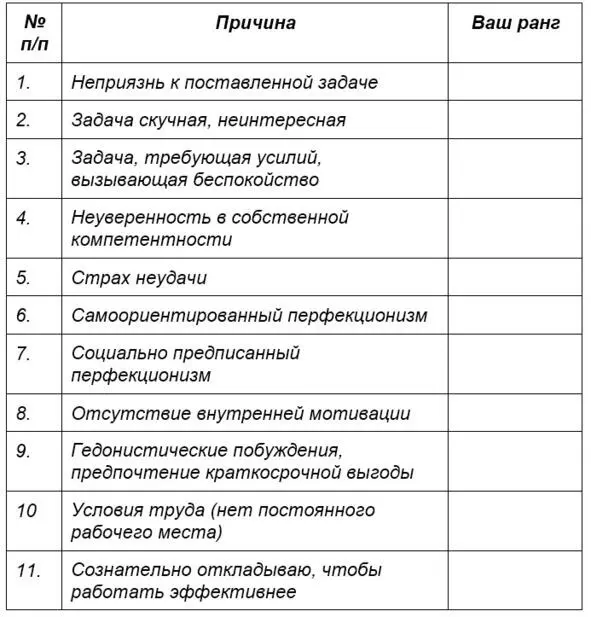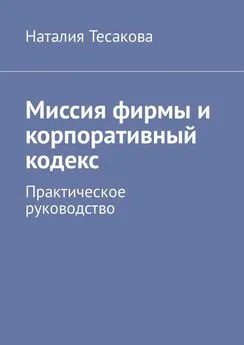Наталья Киреева - Как заставить себя написать научную статью. Практическое руководство по борьбе с академической прокрастинацией
- Название:Как заставить себя написать научную статью. Практическое руководство по борьбе с академической прокрастинацией
- Автор:
- Жанр:
- Издательство:неизвестно
- Год:неизвестен
- ISBN:9785005308252
- Рейтинг:
- Избранное:Добавить в избранное
-
Отзывы:
-
Ваша оценка:
Наталья Киреева - Как заставить себя написать научную статью. Практическое руководство по борьбе с академической прокрастинацией краткое содержание
Как заставить себя написать научную статью. Практическое руководство по борьбе с академической прокрастинацией - читать онлайн бесплатно ознакомительный отрывок
Интервал:
Закладка:
Некоторым прокрастинация нужна 13 13 Laybourn, S., Frenzel, A. C., & Fenzl, T. (2019). Teacher procrastination, emotions, and stress: A qualitative study. Frontiers in Psychology, 10 doi:10.3389/fpsyg.2019.02325
. Некоторые сознательно откладывают задания «на потом», что помогает им приблизиться к дедлайну и работать эффективнее.
Отдельно выделим причины прокрастинации педагога и аспиранта.
Причины прокрастинации педагога 14 14 Laybourn, S., Frenzel, A. C., & Fenzl, T. (2019). Teacher procrastination, emotions, and stress: A qualitative study. Frontiers in Psychology, 10 doi:10.3389/fpsyg.2019.02325
– Неинтересная и скучная задача, требующая усилий
– Задача, не имеющая личного смысла
– Условия труда (нет постоянного рабочего места)
– Гедонистические причины
– Неуверенность в собственной компетентности
– Страх неудачи
Причины прокрастинации аспиранта 15 15 Onwuegbuzie, A. J. (2000). Academic procrastinators and perfectionistic tendencies among graduate students. Journal of Social Behavior and Personality, 15 (5), 103—109
– Самоориентированный перфекционизм
– Социально предписанный перфекционизм
– Страх неудачи
Задание: проранжируйте причины, по которым, как вам кажется, вы откладываете написание научной статьи. Первый ранг у причины, которая в большей степени может быть причиной откладывания написания статьи. Последний ранг у причины, которая практически не оказывает никакого влияния (заполните таблицу на следующей странице).
Последствия

Повышенный воспринимаемый стресс 16 16 Tice, D. M., and Baumeister, R. F. (1997). Longitudinal study of procrastination, performance, stress, and health: the costs and benefits of dawdling. Psychol. Sci. 8, 454—458.
Ухудшение здоровья 17 17 Sirois, F. M., Melia-Gordon, M. L., and Pychyl, T. A. (2003). «I’ll look after my health, later’: an investigation of procrastination and health. Personal. Individ. Differ. 35, 1167—1184. doi: 10.1016/S0191—8869 (02) 00326—4
Депрессия 18 18 Lay, C. H., and Schouwenburg, H. C. (1993). Trait procrastination, time management, and academic behavior. J. Soc. Behav. Pers. 8, 647—662.
Тревога 19 19 Fee, R. L., and Tangney, J. P. (2000). Procrastination: a means of avoiding shame or guilt? J. Soc. Behav. Pers. 15, 167—184.
Стыд 20 20 van Eerde, W. (2003). A meta-analytically derived nomological network of procrastination. Personal. Individ. Differ. 35, 1401—1418. doi: 10.1016/S0191—8869 (02) 00358—6
Негативные эмоции
Потеря уверенности в своих силах
Хорошая новость
Прокрастинация немного уменьшается с возрастом 21 21 Kuncel, N. R., Hezlett, S. A., Ones, D., and Ones, S. (2004). Academic performance, career potential, creativity, and job performance: can one construct predict them all? J. Pers. Soc. Psychol. 86, 148—161. doi: 10.1037/0022—3514.86.1.148
!
Прокрастинация и тип личности
Уровень прокрастинации и направленность личности
Выделяют три типа направленности личности:
– личностную направленность,
– направленность на взаимодействие,
– деловую направленность 22 22 Воронова Т. А., Дубровина С. В., Чепурко Ю. В. Прокрастинация у студентов медицинского вуза с различной направленностью личности // Образование и наука. 2020. Т. 22, №9. С. 86—106. DOI: 10.17853/1994-5639-2020-9-86-106
.
Личностная направленность предполагает удовлетворение мотивов собственного благополучия. Люди с личностной направленностью стремятся к престижу и превосходству.
Направленность на взаимодействие
Конец ознакомительного фрагмента.
Текст предоставлен ООО «ЛитРес».
Прочитайте эту книгу целиком, на ЛитРес.
Безопасно оплатить книгу можно банковской картой Visa, MasterCard, Maestro, со счета мобильного телефона, с платежного терминала, в салоне МТС или Связной, через PayPal, WebMoney, Яндекс.Деньги, QIWI Кошелек, бонусными картами или другим удобным Вам способом.
Примечания
1
L.A. Rabin, J. Fogel, K.E. Nutter-UphamAcademic procrastination in college students: The role of self-reported executive function. Journal of Clinical and Experimental Neuropsychology, 33 (3) (2010), pp. 344
2
Onwuegbuzie, A. J. (2000). Academic procrastinators and perfectionistic tendencies among graduate students. Journal of Social Behavior and Personality, 15 (5), 103—109
3
Laybourn, S., Frenzel, A. C., & Fenzl, T. (2019). Teacher procrastination, emotions, and stress: A qualitative study. Frontiers in Psychology, 10 doi:10.3389/fpsyg.2019.02325
4
Steel P., Konig C.J. (2006) Integrating theories of motivation. Academy of management review, 31 (4), pp. 889—913.
5
Solomon, L. J., and Rothblum, E. D. (1984). Academic procrastination: frequency and cognitive behavioral correlates. J. Couns. Psychol. 31, 503—509. doi: 10.1037/0022—0167.31.4.503
6
Steel, P. (2007). The nature of procrastination: a meta-analytic and theoretical review of quintessential self-regulatory failure. Psychol. Bull. 133, 65—94. doi: 10.1037/0033—2909.133.1.65
7
Solomon, L. J., and Rothblum, E. D. (1984). Academic procrastination: frequency and cognitive behavioral correlates. J. Couns. Psychol. 31, 503—509. doi: 10.1037/0022—0167.31.4.503
8
Haghbin, M., McCaffrey, A., and Pychyl, T. A. (2012). The complexity of the relation between fear of failure and procrastination. J. Ration. Emot. Cogn. Behav. Ther. 30, 249—263. doi: 10.1007/s10942-012-0153-9
9
Grunschel, C., Patrzek, J., and Fries, S. (2013). Exploring reasons and consequences of academic procrastination: an interview study. Eur. J. Psychol. Educ. 28, 841—861. doi: 10.1007/s10212-012-0143-4
10
Visser, L., Korthagen, F. A. J., and Schoonenboom, J. (2018). Differences in learning characteristics between students with high, average, and low levels of academic procrastination: students’ views on factors influencing their learning. Front. Psychol. 9, 1—15. doi: 10.3389/fpsyg.2018.00808
11
Tice, D. M., and Bratslavsky, E. (2000). Giving in to feel good: the place of emotion regulation in the context of general self-control. Psychol. Inq. 11, 149—159. doi: 10.1207/S15327965PLI1103_03
12
Steel, P. (2010). Arousal, avoidant and decisional procrastinators: do they exist? Personal. Individ. Differ. 48, 926—934. doi: 10.1016/j.paid.2010.02.025
13
Laybourn, S., Frenzel, A. C., & Fenzl, T. (2019). Teacher procrastination, emotions, and stress: A qualitative study. Frontiers in Psychology, 10 doi:10.3389/fpsyg.2019.02325
14
Laybourn, S., Frenzel, A. C., & Fenzl, T. (2019). Teacher procrastination, emotions, and stress: A qualitative study. Frontiers in Psychology, 10 doi:10.3389/fpsyg.2019.02325
15
Onwuegbuzie, A. J. (2000). Academic procrastinators and perfectionistic tendencies among graduate students. Journal of Social Behavior and Personality, 15 (5), 103—109
16
Tice, D. M., and Baumeister, R. F. (1997). Longitudinal study of procrastination, performance, stress, and health: the costs and benefits of dawdling. Psychol. Sci. 8, 454—458.
17
Sirois, F. M., Melia-Gordon, M. L., and Pychyl, T. A. (2003). «I’ll look after my health, later’: an investigation of procrastination and health. Personal. Individ. Differ. 35, 1167—1184. doi: 10.1016/S0191—8869 (02) 00326—4
18
Lay, C. H., and Schouwenburg, H. C. (1993). Trait procrastination, time management, and academic behavior. J. Soc. Behav. Pers. 8, 647—662.
19
Fee, R. L., and Tangney, J. P. (2000). Procrastination: a means of avoiding shame or guilt? J. Soc. Behav. Pers. 15, 167—184.
20
van Eerde, W. (2003). A meta-analytically derived nomological network of procrastination. Personal. Individ. Differ. 35, 1401—1418. doi: 10.1016/S0191—8869 (02) 00358—6
21
Kuncel, N. R., Hezlett, S. A., Ones, D., and Ones, S. (2004). Academic performance, career potential, creativity, and job performance: can one construct predict them all? J. Pers. Soc. Psychol. 86, 148—161. doi: 10.1037/0022—3514.86.1.148
22
Воронова Т. А., Дубровина С. В., Чепурко Ю. В. Прокрастинация у студентов медицинского вуза с различной направленностью личности // Образование и наука. 2020. Т. 22, №9. С. 86—106. DOI: 10.17853/1994-5639-2020-9-86-106
Интервал:
Закладка:










